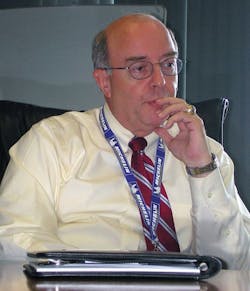Nearly all of the tire manufacturers outside of China were non-committal while the consumer tire import controversy played itself out. Many released statements, but they said little and refused to take sides, even after the final decision was announced.
They all believe in “free and fair trade” with China, but apparently that phrase is open to interpretation depending on the company. The United Steelworkers (USW) deemed the 215% increase in Chinese imports from 2004 through 2008 unfair. So it petitioned the United States International Trade Commission (ITC) for relief.
Only Cooper Tire & Rubber Co. and Toyo Tire Holdings of Americas Inc. took stands. They were against the additional tariffs on Chinese tire imports as outlined by the ITC.
In statements to the U.S. Trade Representative, Cooper abandoned its neutral stance, and was critical of the ITC’s proposal to increase tariffs 55%, 45% and 40%, respectively, over a three-year span.
“The high tariff remedy is not reasonable or rational,” it said. “Such a high tariff would prohibit Cooper Tire from importing any tires from the People’s Republic of China. The added costs of the duties (light vehicle tire imports from China already were being taxed 4%) would make any such imports economically unfeasible.”
President Barack Obama ultimately reduced the recommended tariffs, which he imposed exclusive of each other, to 35%, 30% and 25%. It remains to be seen if the “reduced” tariffs also will prevent Cooper from importing tires from China.
“Cooper’s priority is to continue to meet customers’ needs while balancing the reality of these new business challenges,” said the company following the president’s decision. “The company will act quickly and appropriately to this decision as contingency planning has been under way.
“We are currently assessing our options and will keep all stakeholders informed of decisions as appropriate.” To date, those decisions include announced production expansions at two of its three domestic tire plants, all of which are unionized.
[PAGEBREAK]The closing of its Albany, Ga., plant, which had the capacity to produce 26,300 consumer tires a day, according to Modern Tire Dealer’s 2009 Facts Issue, was at least partially responsible for Cooper’s decision to:
• build a $7 million, 32,000-square-foot addition to its Tupelo, Miss., facility; and
• shift to a 24/7 production schedule at its Texarkana, Ark., plant.
Cooper also expects to increase production volumes at its Findlay, Ohio, facility.
MTD estimates Cooper imports two million to three million tires from its joint venture Chinese operations in Jiangsu province (with Kenda Rubber Industrial Co. Ltd.) and Shandong province (with Chengshan Group Co.).
Toyo also produces tires in the U.S. and, at least prior to the increase in tariffs, imported tires from its joint venture manufacturing plant in China.
“Toyo does not consider the future to be in producing lower- or mid-range tires in the U.S.,” it told the Trade Representative. “The large majority of those tires are made outside of the United States.”
The future is now for Toyo. “In response to the recent trade action taken by the Obama administration, Toyo Tires will soon cease production of U.S.-bound passenger and light truck tires in China,” said the company in a statement following the president’s decision. “Most of those tires will soon be manufactured at our plants in Japan.”
(In August, Toyo Tire & Rubber Co. Ltd., the parent company of Toyo Tire Holdings of America, announced it was building a wholly-owned consumer tire manufacturing plant in China. As a result, Toyo terminated its Chinese manufacturing ventures with Cheng Shin Rubber Ind. Co. Ltd. and Maxxis International Co. Ltd.)
Steve Hutchinson, vice president of marketing for Toyo Tire U.S.A. Corp., says the 35% tariff is going to be absorbed by the consumer in the form of higher prices, and “is going to bring disruption to the market.”
“This is going to change distribution. I remember when I got into the tire business in the ’80s, wholesalers were struggling to survive. When U.S. manufacturers abandoned associate and house brands, all that did was open up the door for those brands to be replaced by other stuff.
That’s when China came in.
“Now that tariffs are so high, they’ve effectively wiped out the bottom tier of the market overnight,” he says. “Personally, I feel we’re in for the largest shortage in the history of the industry.
“My concern for wholesalers is what are they going to sell and where are they going to get product? This industry could — in a couple of years — look like it did 20 years ago, when it had a lot of associate and house brands.”
[PAGEBREAK]
Walking on eggshells
Whereas Cooper Tire had three-year labor agreements in place prior to the USW’s petition, Bridgestone Americas Tire Operations LLC, Michelin North America Inc. and Goodyear Tire & Rubber Co. were faced with expiring contracts and sensitive negotiations. They also import some low-cost tires from their plants in China. Perhaps that explains their reluctance to choose sides then — or now.
Bridgestone was the first tire manufacturer to officially respond to the USW’s petition.
“Bridgestone Americas supports free and fair trade as an essential part of our economic system. It’s important that international trade is conducted on a level playing field that fosters healthy competition, leading to innovation, better quality and lower costs for consumers.
“In the past, we have supported efforts aimed at curbing the unfair trade practices, including the dumping of off-road tires into the U.S. market. Bridgestone Americas is taking a neutral position, however, with respect to the latest 421 petition filed by the United Steelworkers with the U.S. International Trade Commission. While we respect the process and the USW’s right to bring forward such a petition, we are still studying the petition, and at this point have not determined whether there are unfair trade practices in this situation that would require intervention by the U.S. International Trade Commission.”
A Goodyear spokesman echoed some of those thoughts. “We are still learning the details and have no position on the filing at this time,” he said.
“Goodyear has always supported free and fair trade, and will support whatever decision is made in this case.”
When the USW originally filed its petition, Michelin released this statement: “Michelin has always supported a strong free trade practice that allows manufacturers to compete fairly in a global marketplace. Michelin North America agrees that existing U.S. trade laws should be enforced, including the assurance that all tire imports fully comply with stringent DOT guidelines and the NHTSA safety regulations.
“The USW filing appears to support a thorough and independent review of current market data regarding tire imports. Michelin will cooperate fully with any investigation.”
CEO Dick Wilkerson says the additional tariffs will affect demand in the market. However, Groupe Michelin’s operations in China focus on the Chinese market; no more than 2% of Michelin North America’s tire shipments in the U.S. are imported from China.
“The vast majority of imports we bring in are from Europe,” says Wilkerson. “It’s not going to affect our business model at all.” ■
[PAGEBREAK]
Supporters vs. opponents -- Final tally shows government involvement in Chinese import controversy
Over the course of five months, lines were drawn both ideologically and philosophically over the issue of whether or not to increase tariffs on Chinese consumer tire imports.
President Barack Obama, given his decision, obviously supports it. Here are the on-the-record supporters and opponents of the 1) tariffs specifically or 2) the restriction of Chinese consumer tire imports in general.
Supporters: United Steelworkers; AFL-CIO; United Auto Workers Union; National Cotton Council and National Farmers Union; Senators Arlen Specter (D-Pa.), Sherrod Brown (D-Ohio), Evan Bayh (D-Ind.), Robert Casey (D-Pa.), Blanche Lincoln (D-Ark.), Debbie Stabenow (D-Mich.), Kirsten Gillibrand (D-N.Y.), Lindsey Graham (R-S.C.), Mark Warner (D-Va.), Kay Hagan (D-N.C.) and Richard Burr (R-N.C.); Representatives Tom Cole (R-Okla.), Peter DeFazio (D-Ore.), Jason Altmire (D-Pa.), Tim Ryan (D-Ohio), Louise Slaughter (D-N.Y.), Carolyn Cheeks Kilpatrick (D-Mich.), Peter Visclosky (D-Ind.), Tim Murphy (R-Pa.), Joe Wilson (R-S.C.), Robert Aderholt (R-Ala.), Mark Souder (R-Ind.), John Murtha (D-Pa.), Alan Mollohan (D-W.V.), Shelly Moore Capito (R-W.V.), Steven LaTourette (R-Ohio), Dennis Kucinich (D-Ohio) and Bart Stupak (D-Mich.); Committee to Support U.S. Trade Laws; International Association of Machinists and Aerospace Workers; ITC commissioners Shara Aranoff (chairman), Charlotte Lane, Irving Williamson and Dean Pinkert.
Opponents: American Coalition for Free Trade of Tires (Dunlap & Kyle Co., Del-Nat Tire Corp, American Omni Trading Co., Hercules Tire & Rubber Co., Orteck Global Supply & Distribution Co., GITI Tire (USA) Ltd. and Foreign Tire Sales Inc.); TBC Corp.; American Pacific Industries Inc.; Cooper Tire & Rubber Co. and Toyo Tire Holdings of Americas Inc.; Tire Group International Inc.; Tire Wholesalers Co. Inc.; Community Wholesale Tire Inc.; Tire Industry Association; China Rubber Industry Association; Les Schwab Tire Centers; Representative Greg Walden (R-Ore.); Senators Ron Wyden (D-Ore.) and Jeff Merkley (D-Ore.); General Motors Corp., Ford Motor Co. and Chrysler Group LLC; Retail Industry Leaders Association; Performance Fibers; Tyson Foods Inc. and Hormel Foods Corp.; ITC commissioners Daniel Pearson (vice chairman) and Deanna Okun.




